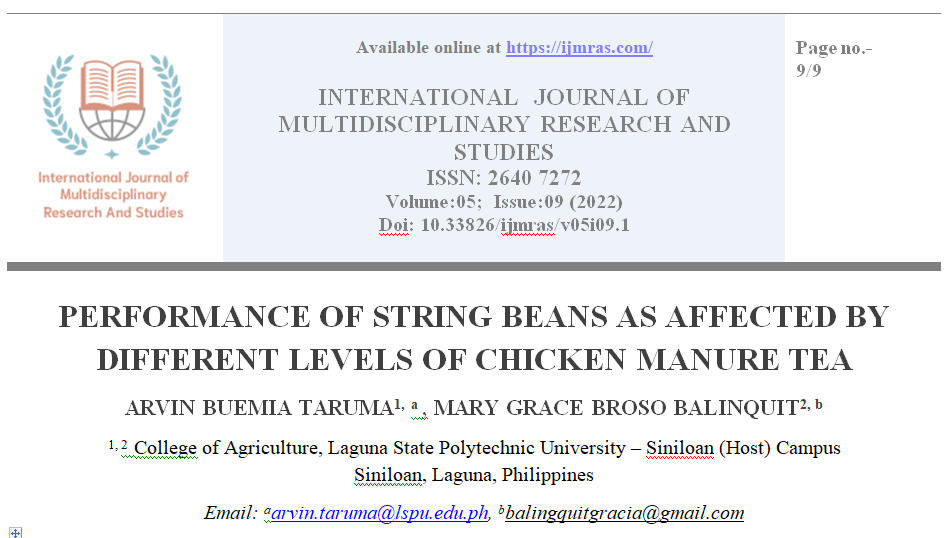PERFORMANCE OF STRING BEANS AS AFFECTED BY DIFFERENT LEVELS OF CHICKEN MANURE TEA

Abstract
This study was conducted to look for alternative measures to sustain the profitability of cultivating string beans by using different levels of chicken manure tea. An Experimental Research in Randomized Complete Block Design (RCBD) was used in this study of different levels of chicken manure tea as treatment. The treatments used were as follows: Control (T1), Chicken manure tea at 25%: 75% water dilution (T2), Chicken manure tea at 50%: 50% water dilution (T3), and Pure chicken manure tea (T4). The results show that growth characteristics such as the number of days from sowing to flowering, to fruiting, to harvesting, plant height, and yield components including the diameter of pods, the weight of pods per harvest area, and computed yield per hectare did not show significant difference among treatment means and not affected by different levels of chicken manure tea as fertilizer materials. However, the length of pods was affected by different levels of chicken manure tea as a treatment used in the study. It can be concluded that different levels of chicken manure tea as fertilizer materials does not significantly affect the growth and yield of string bean. However, the concentration of pure chicken manure tea (T4) increased the production and net income of string beans, and replication of the study is recommended and the use of other crops may also be considered in this study.
Keywords
Chicken manure tea, Chicken manure, Levels of chicken manure, String beans.How to Cite
References
Adediran, J.A. et al. (2004). Application of organic and inorganic fertilizer for sustainable maize and cowpea yields in Nigeria. J. Plant Nutr., 27(7):1163-1181.
Gross, A., R., et al. (2008). Assessment of extraction methods with fowl manure for the production of liquid organic fertilizers. Biores. Technol., 99(2): 327-334
Javanmardi J. and Ghorban E. (2012) Effects of chicken manure and vermicompost teas on herb yield, secondary metabolites and antioxidant activity of lemon basil (Ocimum × citriodorum Vis.) Adv. Hort. Sci., 2012 26(3-4): 151-157.
Manullah, M.M., et al. (2007). Poultry manure to crops - A Review. Agric. Rev., 28: 216-222.
Philippine Rice Research Institute. (2010). Pinoy rice knowledge bank.www.philrice.gov.ph |
ROU, 2007. Recycled Organics Unit, Overview of compost tea use in New South Wales. 2nd ed.<http://www.recycledorganics.com>
Shaheen A.M., et al. (2018). Chicken Manure Tea and Effective Micro-organisms Enhanced Growth and Productivity of Common Bean Plants. Middle East Journal of Agriculture Research ISSN 2077-4605: PP.1419-14
Tomar, B. S. (2001). Seed Production Unit, Division of Seed Science & Technology and Dr. Balraj Signh, Indo-Israel Project, IARI, New Delhi-1.
License
Copyright (c) 2022 ARVIN BUEMIA TARUMA, MARY GRACE BROSO BALINQUIT

This work is licensed under a Creative Commons Attribution 4.0 International License.
Individual articles are published Open Access under the Creative Commons Licence: CC-BY 4.0.




